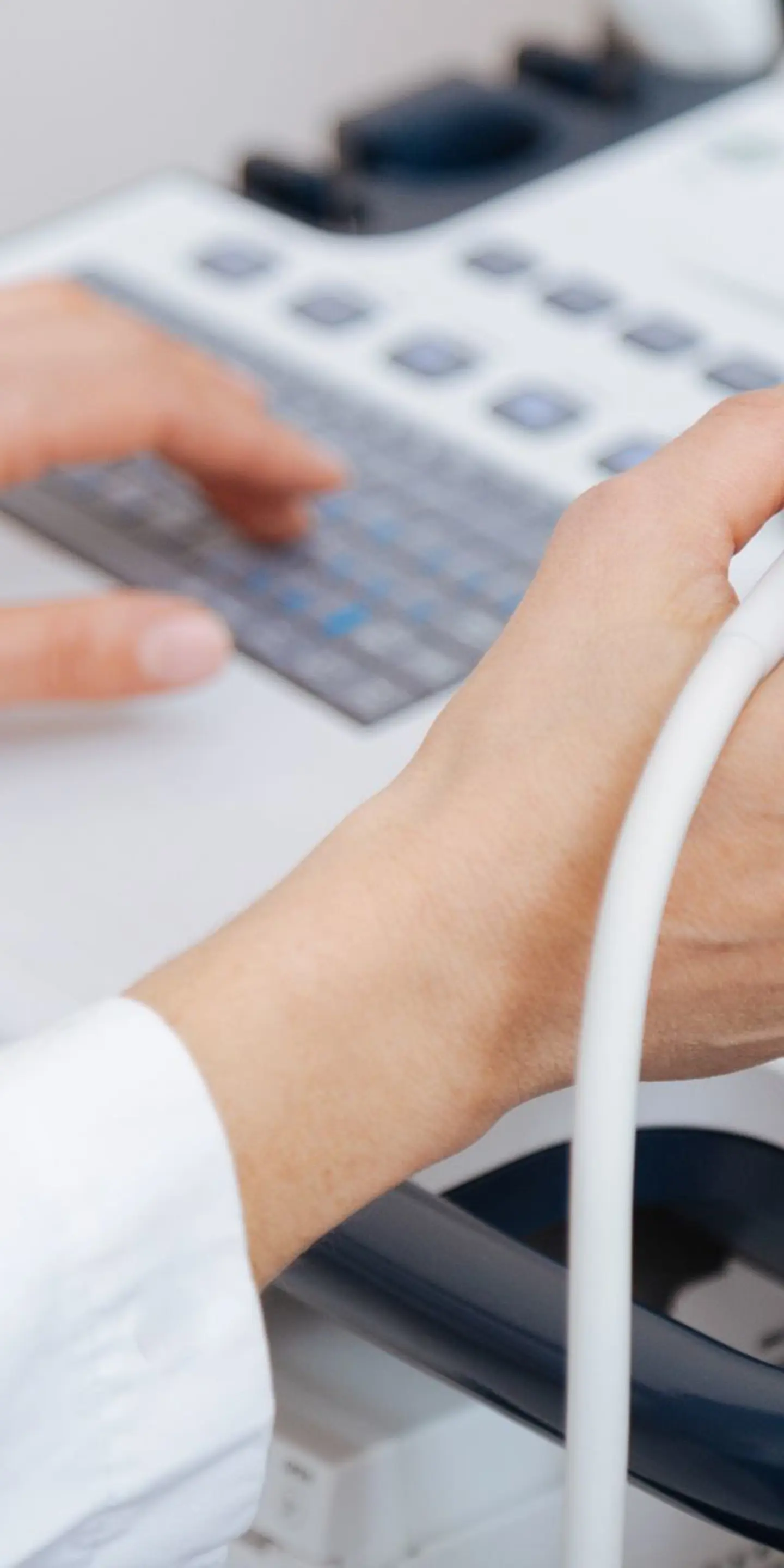
Clinically reviewed by Peter Kabogoza
National Clinical Lead - Ultrasound
Can an ultrasound scan detect a hernia?
Are you worried that you have a hernia? An ultrasound scan is a safe, quick and painless way to get an accurate diagnosis. This imaging test uses harmless ultrasound waves to create real time images of the inside of your body.
So, can an ultrasound scan detect a hernia? Yes. Here’s how it works, what to expect, and the benefits and limitations of hernia ultrasound scans.
How ultrasound scans identify hernias
Ultrasound scans use high frequency sound waves to create images of the inside of your body. These sound waves are beyond the limit of human hearing. As they pass through your body, they are bounced back or reflected when they meet boundaries between different tissues or areas of different densities.
These reflected sound waves are called echoes. As over 1,000 echoes can be detected every second, live images of your tissues can be created.
Ultrasound is especially good at creating images of soft tissues, such as muscles, ligaments and tendons. This makes it ideal for detecting hernias.
Types of hernias detected by ultrasound
A hernia refers to part of an organ or tissue inside your body that’s pushing outward due to a weak spot in the surrounding muscle or connective tissue. Ultrasound imaging can be a useful tool in diagnosing many, but not all, types of hernias.
Types of hernias detected by ultrasound imaging include:
-
Femoral hernia — where part of the bowel or fatty tissue pushes through the groin on the inside of the upper thigh via a passage called the femoral canal
-
Inguinal hernia — where part of the bowel or fatty tissue pushes through the groin at the top of the inner thigh via a passage called the inguinal canal
-
Incisional hernia — where part of the bowel or fatty tissue pushes through a cut in the abdomen made during surgery that has not fully healed
An inguinal hernia is the most common type of hernia and usually occurs in men. A femoral hernia occurs more commonly in women. Both are age related, that is, they become likely to occur as you get older.
A hiatus hernia, where part of the stomach pushes upward via a hole in the diaphragm, cannot be easily detected with an ultrasound scan. A CT scan (computed tomography scan) or MRI scan may be needed to diagnose a hiatus hernia.
Hernia symptoms
Hernias often do not cause any symptoms. However, when symptoms occur, hernias tend to cause a visible bulge, lump or swelling in your abdomen (abdominal wall) or groin area.
This lump may disappear when you lie down and reappear when coughing, bending over or straining. These actions may also cause some pain, discomfort or a dull ache in the affected area.
Comparing ultrasound with other diagnostic methods
Although ultrasound imaging doesn’t produce images that are as detailed as MRI scans or CT scans, they are still very useful for investigating soft tissues and have several benefits.
While CT scans use X rays, an ultrasound scan does not expose you to any radiation. This makes them safe to perform in pregnant women. It also means that you can self refer for a private ultrasound scan without needing a doctor to refer you.
Ultrasound imaging does not use any powerful magnets, which are used in MRI scans. This means if you have metal implants that are not compatible with MRI, you can still safely have an ultrasound scan.
Ultrasound scans are usually faster than a CT or MRI scan and you do not need to stay perfectly still. This is because they are designed for live imaging.
Ultrasound imaging is also more comfortable if you struggle with confined spaces. The scanning device is a handheld ultrasound probe rather than a machine that you need to lie inside as with MRI and CT scans.
Before and after your ultrasound appointment
You can eat and drink as usual before your ultrasound appointment and continue to take your medications as prescribed.
You will probably be asked to change into a hospital gown at your ultrasound scan appointment, so try to wear loose, comfortable clothing that’s easy to change out of.
As a hernia ultrasound scan is non invasive, it does not require any sedation. It also doesn’t use any contrast agent. This means you can return to your usual activities, including physical activity, immediately after your scan.
What to expect during your ultrasound procedure
During your ultrasound procedure, the area of your body to be scanned will be gently wiped clean, and a gel will be applied.
As the probe is moved over your body, live greyscale images of the inside of your body will be transmitted to a screen. Some gentle pressure may be applied, if needed, to create clearer images.
Your ultrasound scan may take up to 20 minutes to complete.
Benefits and limitations of ultrasound in hernia diagnosis
Ultrasound is a quick, painless and cost-effective way to diagnose hernias by creating real-time images of the inside of your body. It’s often the first choice among imaging techniques for hernia diagnosis.
However, ultrasound produces lower resolution images than CT and MRI scans. It’s, therefore, not as effective at diagnosing small hernias or hernias that are not visible on physical examination.
Ultrasound is also less effective at diagnosing hiatus hernias due to the position and nature of the hernias and interference from gas in the stomach. Similarly, it can be harder to detect hernias using ultrasound in individuals who are obese due to interference from excess fat.
Your hernia ultrasound results
At Vista Health, we aim to deliver your scan results within 3 working days. This report can be sent to your NHS GP or you can book a GP consultation with a Vista Health GP.
They will explain exactly what your results show and the next steps if a hernia is diagnosed. This might include further investigations or treatment (eg open surgery for a hernia or keyhole hernia surgery).
Get clarity on your health today
If you’re concerned that you may have a hernia, get peace of mind with Vista Health. Have your symptoms investigated with a private ultrasound scan at one of our nationwide clinics. Simply self refer and book online today.
Sources
https://www.nhs.uk/conditions/hernia
https://www.whittington.nhs.uk/default.asp?c=45100


